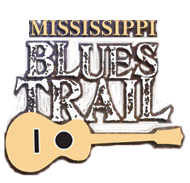Overton Park Shell
Overton Park Shell - Memphis
The Overton Park Shell was built in 1936 by the federal Works Progress Administration and the city of Memphis, and initially featured symphony concerts, theater, chamber music and light opera. Elvis Presley played his first professional Memphis concert here in 1954, and between 1966 and 1970 the Memphis Country Blues Festival was staged here with artists including Mississippi Fred McDowell, Bukka White, Furry Lewis, Rev. Robert Wilkins and Rufus Thomas. Other musicians who were born or based in Mississippi who played here included Albert King, R.L. Burnside, Junior Kimbrough, Jessie Mae Hemphill and the North Mississippi Allstars.
Memphis has been a favored destination for Mississippi musicians since the earliest days of the blues, and the Overton Park Shell has played an important role in advancing their visibility. One of many public stages constructed by the Works Progress Administration to relieve mass unemployment and enhance civic life, The Shell quickly became a staple of the city’s entertainment life. Blues songs were likely first performed here during the segregation era by white jazz groups, and Elvis Presley’s first professional show here on July 30, 1954, featured his debut single, a cover of Mississippi bluesman Arthur “Big Boy” Crudup’s 1946 recording “That’s All Right.”
The All Memphis Folk Festival held here in August 1963 included musicians James Luther Dickinson, a longtime resident of Mississippi, and Greenville native Sid Selvidge, who were active in Memphis’ burgeoning “blues revival” scene, presenting older blues artists to young, largely white audiences, and were performers at and organizers of the annual Memphis Country Blues Festivals (1966-1970). The shows were staged here in the wake of civil rights protests at The Shell by thirteen African American students in 1960 that led to court-ordered desegregation of all public facilities in Memphis. The festival was the first to explicitly focus on acoustic “country blues” styles from the pre-WWII era, and the lineups expanded to include soul, jazz, gospel, and blues-rock artists including Johnny Winter. The 1969 event featured Rufus Thomas and the Bar-Kays, who were also featured at individual shows at The Shell in the late ’60s and early ’70s—Thomas with his children Carla and Marvell. Other featured soul/funk luminaries who played The Shell included Booker T & the MGs, Eddie Floyd, Isaac Hayes, the Staple Singers, Brothers Unlimited and the Willie Mitchell band with vocalist Don Bryant.
In the early 1970s, The Shell hosted national artists including blues-rockers the Allman Brothers, ZZ Top, Bonnie Raitt and Leon Russell, who was touring with Freddie King, while the next decades featured more local artists. A 1980 series presented by University of Memphis professor and musician Dr. David Evans featured R.L. Burnside, Ranie Burnette, Jessie Mae Hemphill, the Fieldstones, Mose Vinson and Napolian Strickland, and a 1992 Arts in the Park show included Albert King, James “Son” Thomas and Memphis artists Booker T. Laury, Joyce Cobb, Herman Green and Ruby Wilson. Over the decades The Shell was threatened with closure, but after aligning in 2005 with the national Levitt Foundation it began hosting wide-ranging concert series at the Levitt Shell. Featured blues artists included Hubert Sumlin, Bobby “Blue” Bland, Gary Clark Jr., Robert Cray, Eric Gales, Marcia Ball, Big George Brock and Eden Brent. A 2017 “Country Blues Festival” featured Rev. John Wilkins, who had played with his father, Rev. Robert Wilkins, here in the 1960s, and an annual Memphis Country Blues Festival returned in 2021, featuring artists including Cedric Burnside, Alvin Youngblood Hart, Yella P., Libby Rae Watson, and the North Mississippi Allstars. In 2022 the venue returned to the name Overton Park Shell with a continuing commitment to presenting an eclectic variety of live music.
Research/photo assistance: Cole Early, Natalie Wilson, Robert Gordon, Augusta Palmer, David Leonard; text by Scott Barretta
content © Mississippi Blues Commission
[ BACK TO TOP ]

